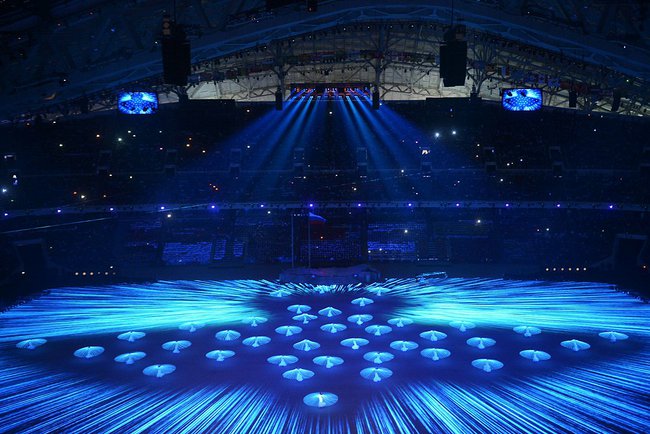
11/02/2014, by CLAS
Dreaming of Russia in Sochi
Dr Polly McMichael, lecturer in the Department of Russian and Slavonic Studies, gives some first impressions of the opening ceremony for the Sochi Winter Olympics, and considers how it played to global and Russian television audiences.
At 20:14 Moscow Time on Friday 7 February the worldwide live broadcast of the opening ceremony for the Sochi Winter Olympics began. The protagonist, a slumbering and dreaming child whose name – Liubov’ – is the Russian word for “love”, introduced the world’s viewers first to the Cyrillic alphabet, illustrated by names and achievements signifying Russia’s contributions to culture, science and technology. In Liubov’s dreams we then saw a narrative of the construction of Russia – culminating, of course, in the building of the very stadium in which the ceremony was taking place. Layered and intermingling in the dream sequences were the aesthetics of Slavic fairy tales, Soviet cartoons, medieval Rus’, the Russian Enlightenment, 19th century aristocratic entertainment, the early 20th century avant garde, and Socialist Realism. As with all such selective presentations of history, the narrative provoked controversy by its omissions. Criticism perhaps found its target most effectively when pointing out that this was by and large a Slavic, rather than a multi-ethnic, Russia.
In recent months, and escalating in the run-up to the Winter Olympics, it has sometimes appeared as if Russia’s chief contribution to culture is its production line of weird and wonderful stories, photographs and videos. As a recent article suggests, the idea of Russia as a source of raw material for social media shock and comment resurrects and rewrites for the internet age views of Russia like those propagated by European travellers during pre-Petrine and Imperial times – a barbarous land, characterised by the extreme and the incomprehensible. The Sochi opening ceremony seemed calculated to wash away any easily consumable glimpses of wildness and ugliness that might have coagulated in the global popular imagination. It reminded the world instead of a Russia responsible for beauty in both ideas and the forms in which they are expressed, whether this be the sound of Orthodox church bells or Vera Mukhina’s Worker and Kolkhoz Woman.
Throughout Konstantin Ernst’s spectacle retained an awareness that it had two audiences. Ernst spoke explicitly of using cultural references which the world (read: the West) would recognise. The music selection foregrounded a version of the classical Russian canon – Borodin, Tchaikovsky, Rimsky-Korsakov, Stravinsky, Khachaturian, as well as Georgy Sviridov’s iconic Vremia, vpered! – Time, Forward film score, once used as the opening theme of the Soviet television news. Pop music references were always going to mean more to the Russian audience than to the global one, although Ernst tried his best by persuading the singing duo t.A.T.u., succès de scandale over a decade ago, to reunite for the show. Russian speakers could appreciate the significance of the use of their Russian hit (and Western flop) ‘Nas ne dogoniat’ / ‘Not Gonna Get Us’ when the national team entered (the literal meaning of the lyric is “they won’t catch up with us”).
The duality in the messages for Russian and for worldwide viewers in the show will make for some interesting unravelling. I’ll just give one further example here. The climax of the live choreographed show came in a sequence featuring prams and nannies, performed on the red and black newsprint slogan: “Дети – наше будущее” – “Children are our future”. The global spectacle set this non-specific message of hope somewhere in an indeterminate and stylised post-war ‘thaw’. For Russian viewers, though, the message was unambiguous. Their point of reference was Russia’s 2013 birth rate, which for the first time since 1990 exceeded the mortality rate. The Russian television audience could recognise this culmination as a tribute to the Putin era, likening today’s times too to processes of heroic, happy rebuilding and rebirth. Little Liubov’ drifted up to stand on a small blue planet floating high in the Fisht stadium and await her future.
(Photograph: Presidential Press and Information Office, www.kremlin.ru)
No comments yet, fill out a comment to be the first

Leave a Reply